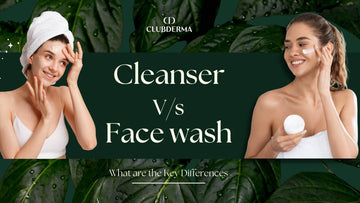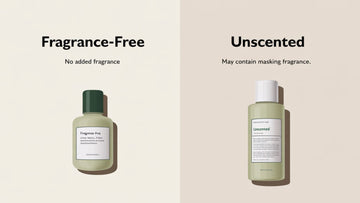When it comes to skincare, one of the most important steps is cleansing. It’s the foundation of any good skincare routine, yet many people still wonder about the difference between cleansers and face washes. Are they the same thing? Do you need both? How do you know when to use which one? In this post, we’ll delve into the differences between cleansers and face washes, their specific roles in your skincare routine, and how to make the right choice based on your skin type and needs.
What is a Cleanser?
A facial cleanser is a product designed to remove dirt, oil, makeup, and other impurities from your skin. Unlike face washes, which often have a more soapy or foamy consistency, cleansers are typically more gentle and hydrating. They can come in different forms, such as gels, creams, balms, or micellar water. The primary function of a cleanser is to clean your skin without stripping away its natural moisture, making it ideal for daily use.
Cleansers are usually formulated for a broader range of skin types, from dry to sensitive skin. They provide a deep cleanse without the harshness of some face washes, making them a preferred choice for people with sensitive or dry skin. Cleansers are also great for removing makeup, sunscreen, and excess oil without causing irritation or dryness.
What is a Face Wash?
A face wash, on the other hand, is typically a foaming or gel-based product that cleans your skin, targeting excess oil, grime, and sweat. Face washes tend to have a soap-like consistency and are designed to cleanse deeper than a cleanser, which is why they are often recommended for those with oily or acne-prone skin. However, face washes can be drying if used too frequently, as they are typically more intense in removing oils and impurities.
While a face wash is great for that "fresh out of the shower" clean feeling, it can sometimes be too harsh for those with sensitive or dry skin. It's important to pick a face wash that aligns with your skin type to avoid stripping away too much natural oil, which can lead to irritation or increased oil production as your skin tries to compensate.
Key Differences Between Cleanser and Face Wash
- Formulation: Cleansers often have a thicker, creamier consistency compared to the typically lighter and foamy texture of face washes. This difference in texture also reflects their purpose, as cleansers aim to gently clean and hydrate, while face washes are focused on deeper cleansing.
- Skin Type Suitability: Cleansers are usually best for sensitive, dry, or combination skin, while face washes are more effective for oily or acne-prone skin. A cleanser provides gentle care, while a face wash tackles the root of oiliness and breakouts.
- Hydration: Cleansers generally include moisturizing ingredients that help keep your skin hydrated, while face washes, especially those for oily or acne-prone skin, focus more on removing excess oil. As a result, face washes can sometimes leave the skin feeling tight or dry, whereas cleansers leave it softer.
- Frequency of Use: Cleansers can typically be used twice daily—morning and night—due to their gentle nature. Face washes, because they are often more drying, may be better suited for once-a-day use unless you have very oily skin.
- Cleansing Power: If you’ve been wearing makeup, sunscreen, or have been exposed to pollutants, a cleanser will effectively remove these substances without damaging the skin’s protective barrier. A face wash, however, is more suited to thoroughly clearing out excess oil and sweat.
When to Use a Cleanser vs Face Wash
The choice between using a cleanser or a face wash depends largely on your skin type and lifestyle.
- For Dry or Sensitive Skin: Stick to a cleanser. Its hydrating properties will keep your skin nourished while ensuring it’s free from dirt and makeup. Opt for cream or balm-based cleansers that soothe and moisturize.
- For Oily or Acne-Prone Skin: A face wash may be your go-to product, especially if you have frequent breakouts or a shiny complexion. Gel-based face washes that target oil control and minimize pores are ideal for this skin type.
- For Combination Skin: You might want to use both products, depending on your skin's needs at different times. For instance, you could use a gentle cleanser in the morning and a stronger face wash at night after a long day.
- For Makeup Removal: A cleanser is often the better option. Cleansers, especially oil-based or micellar water cleansers, are more effective at breaking down makeup and removing sunscreen without being harsh on the skin.
- Post-Workout: After sweating, a face wash can help remove sweat and excess oil from your skin, especially if you’re prone to breakouts.
Types of Cleansers and Face Washes
There are several types of cleansers and face washes, each serving different purposes based on skin type and preference.
Types of Cleansers:- Gel Cleanser: Lightweight and hydrating, ideal for oily or combination skin.
- Cream Cleanser: Thick and moisturizing, perfect for dry or sensitive skin.
- Micellar Water: A water-based cleanser that gently removes makeup and impurities.
- Foam Cleanser: Lightweight but effective, good for normal to combination skin types.
- Gel Face Wash: Commonly used for oily skin as it removes excess oil without leaving residue.
- Foaming Face Wash: Provides a thorough clean and is ideal for combination skin.
- Exfoliating Face Wash: Contains gentle exfoliating particles to slough away dead skin cells; not for daily use as it can be abrasive.
Can You Use a Cleanser Instead of a Face Wash?
Yes, you can use a cleanser instead of a face wash, especially if your skin is more sensitive or dry. Cleansers are effective at removing dirt and makeup while maintaining moisture. For those with oily or acne-prone skin, using a face wash may still be necessary to control excess oil and prevent breakouts. It’s important to listen to your skin’s needs and adjust your routine accordingly.
How to Use a Cleanser and Face Wash in Your Routine
- Cleansers: Apply a small amount to damp skin, massaging it in circular motions. You can use it morning and night, especially if you have dry or sensitive skin. After massaging the product into your skin, rinse with lukewarm water and pat your face dry.
- Face Washes: Use a face wash when you need a deeper clean, such as after a workout or at the end of the day. Apply the face wash to wet skin, gently lather, and rinse thoroughly. Always follow up with a moisturizer to replenish the skin’s hydration.
Conclusion
Both cleansers and face washes play important roles in skincare, but understanding the key differences between them can help you choose the right product for your skin. Cleansers are your go-to for gentle daily cleaning, hydration, and makeup removal, while face washes are better for deep cleansing and controlling oil.








